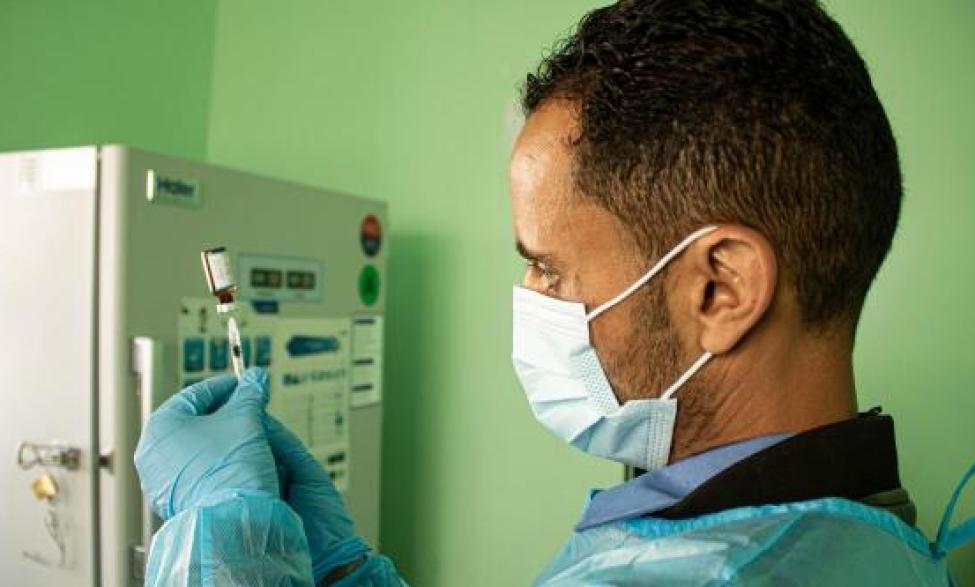-
من نحن
من نحنالمنظمة الدولية للهجرة هي المنظمة الحكومية الدولية الرائدة في مساندة الهجرة الإنسانية والمنتظمة التي تخدم الجميع، ولها حضور في أكثر من 100 بلد. ويعود تواجد المنظمة الدولية للهجرة في اليمن إلى عام .1994
معلومات عن
معلومات عن
المنظمة الدولية للهجرة في العالم
المنظمة الدولية للهجرة في العالم
-
عملنا
عملنابصفتها المنظمة الحكومية الدولية الرائدة التي تعمل على تعزيز الهجرة الإنسانية والمنظمة، تلعب المنظمة الدولية للهجرة دوراً رئيسياً في دعم تحقيق خطة التنمية المستدامة لعام 2030 من خلال مجالات التدخل المختلفة التي تربط بين المساعدات الإنسانية والتنمية المستدامة. وتدعم المنظمة الدولية للهجرة الفئات الضعيفة في مختلف أنحاء اليمن بما في ذلك النازحون والمهاجرون والمجتمعات المتأثرة من الصراع.
ماذا نفعل
ماذا نفعل
القضايا العالمية الشاملة
القضايا العالمية الشاملة
- البيانات والمصادر
- بادِر
- 2030 Agenda
Ta’iz – Years of conflict in Yemen has resulted in a near collapse of already fragile public infrastructure, leaving approximately 66 per cent of the population in need of humanitarian assistance.
Yemen’s health-care system is not exempt from the deterioration of public services, especially in rural areas of the country. Only half of the health facilities in Yemen are fully or partially functioning, and many of these still lack basic requirements such as fuel, water, essential medical supplies and qualified health staff.
“In the past, health centres and hospitals were not fully equipped. It could take up to an hour to get a sick person to the nearest hospital where they could get the care they needed and the fees were often far too expensive,” explained Fouad, who lives with his elderly parents, wife and children in a high, rough mountainous area in Ta’iz governorate.
In rural areas like this, people live in hard-to-reach towns, where the only routes to the villages are rugged roads.
Alroos Hospital was the only available health facility near Fouad’s home, but the hospital was barely functioning with limited resources and could not meet the surging demand for health care in the district.
“The hospital lacked the qualified doctors, had no medicine and did not even have a proper a delivery room,” said Fouad.
“We had to take a tiring and long trip to the city to find a good hospital when my family members needed care. The worst part was the bumpy and narrow road that we had to cross on foot to reach the nearest area with transportation.”
Fouad had witnessed many of the tragic situation facing people with health conditions in his community. Many of these people, especially pregnant women, sadly perished.
“One night, a neighbour’s wife was about to deliver her first child. We wanted to rush her to the hospital, but we could not find a car to take her. Back then, Alroos Hospital did not have the equipment to help her,”
In their despair to save the woman and her baby, it took Fouad and his neighbours an hour to walk to the main street, carrying the pregnant woman. Then it took them another hour to reach the hospital in Ta’iz city.
“Our efforts were lost in vain that night, the mother and baby lost their lives. That was the saddest day for me,” explained Fouad, remembering how much he wished there were proper health services in his area that could have saved her.
Like many other health-care facilities in war-torn Yemen, Alroos Hospital was suffering from severe shortages in health workers and supplies. The hospital was really just a simple health centre with limited maternal and neonatal services.
To meet the crucial need for health care in Saber Al Mawadem, the International Organization for Migration (IOM) partnered with Qatar Charity to upgrade Alroos Hospital and improve the health services provided to the rural community in that area.
“IOM supported the rehabilitation of the facility and supplied it with medical supplies and medicine so the hospital could provide appropriate health care to the community,” said Dr. Ahmed, IOM health focal point in Ta’iz.
IOM’s support also included training midwives and health workers, as well as providing financial incentives for all medical and administrative staff to overcome the shortage of staff in the hospital.
“The vital support that this hospital has received from IOM has improved the health services that we offer,” said Dr. Abdulkhalq, manager of the Alroos Hospital.
Now, an additional obstetrician, gynecologist and seven midwives are available to receive patients at all times of the day, and women can receive antenatal, delivery and post-natal health care services as well as consultation and treatment for gynecological conditions at all times.
The hospital can provide children with primary health services as well, which include diagnosing and treating various diseases.
Thanks to support provided by Qatar Charity, more than 70,000 people can have access to primary and secondary healthcare in Saber Al Mawadem district.
Written by Majed Mohammed and Mennatallah Homaid IOM Yemen Communication Assistants




